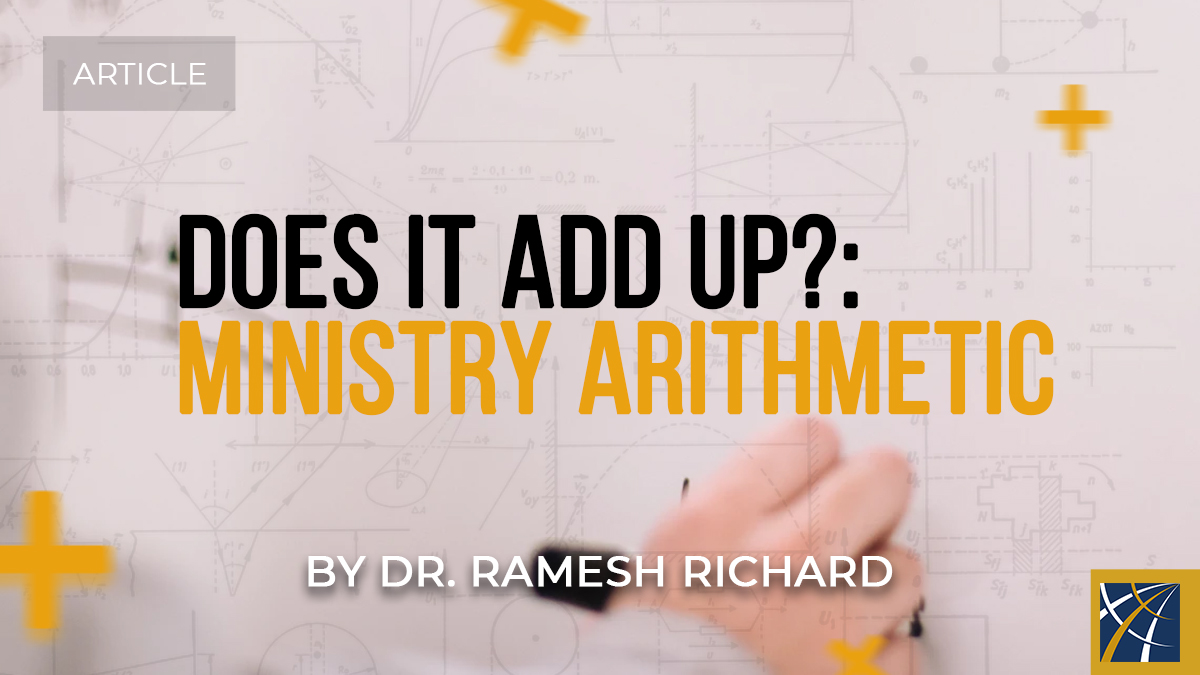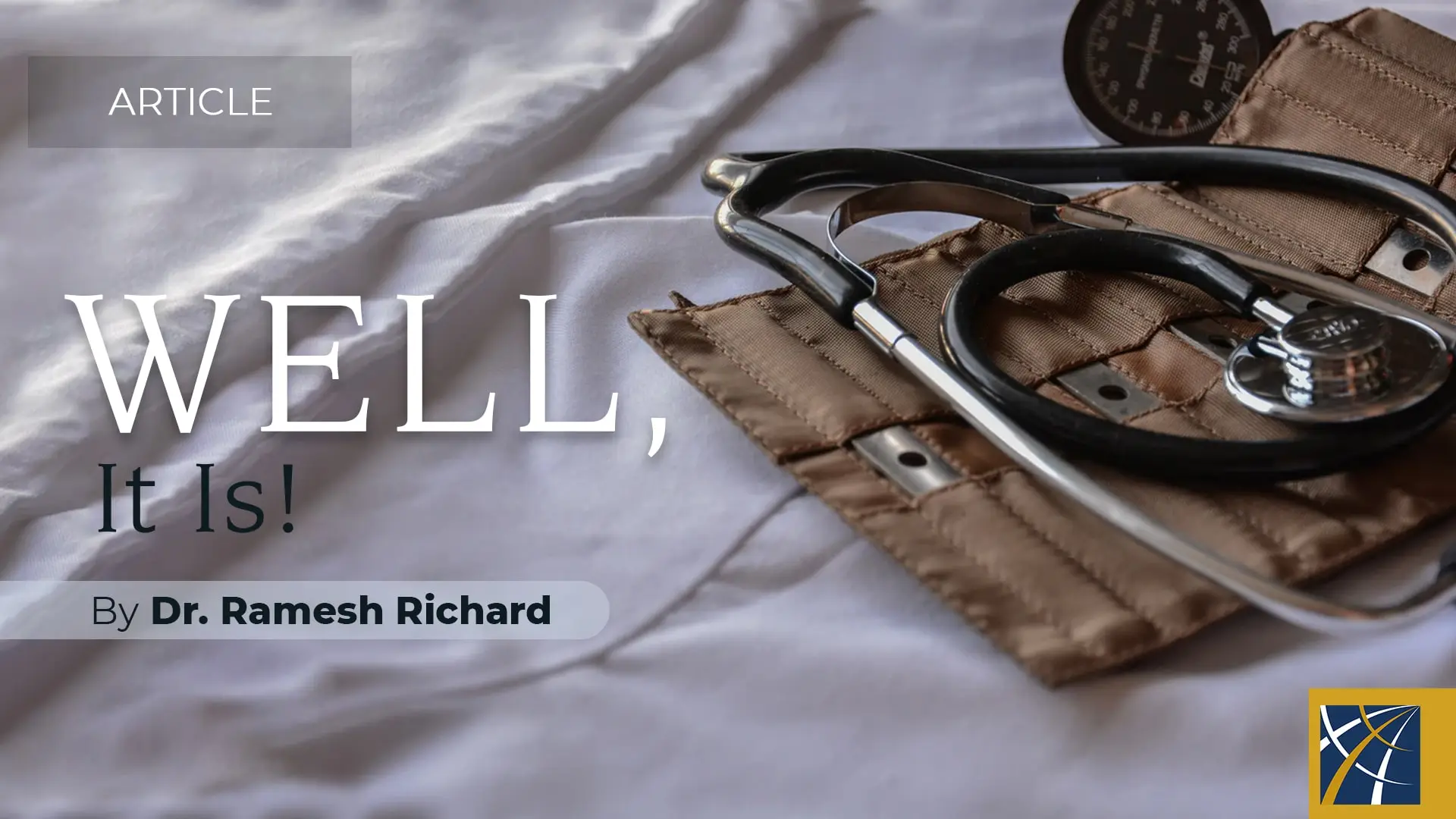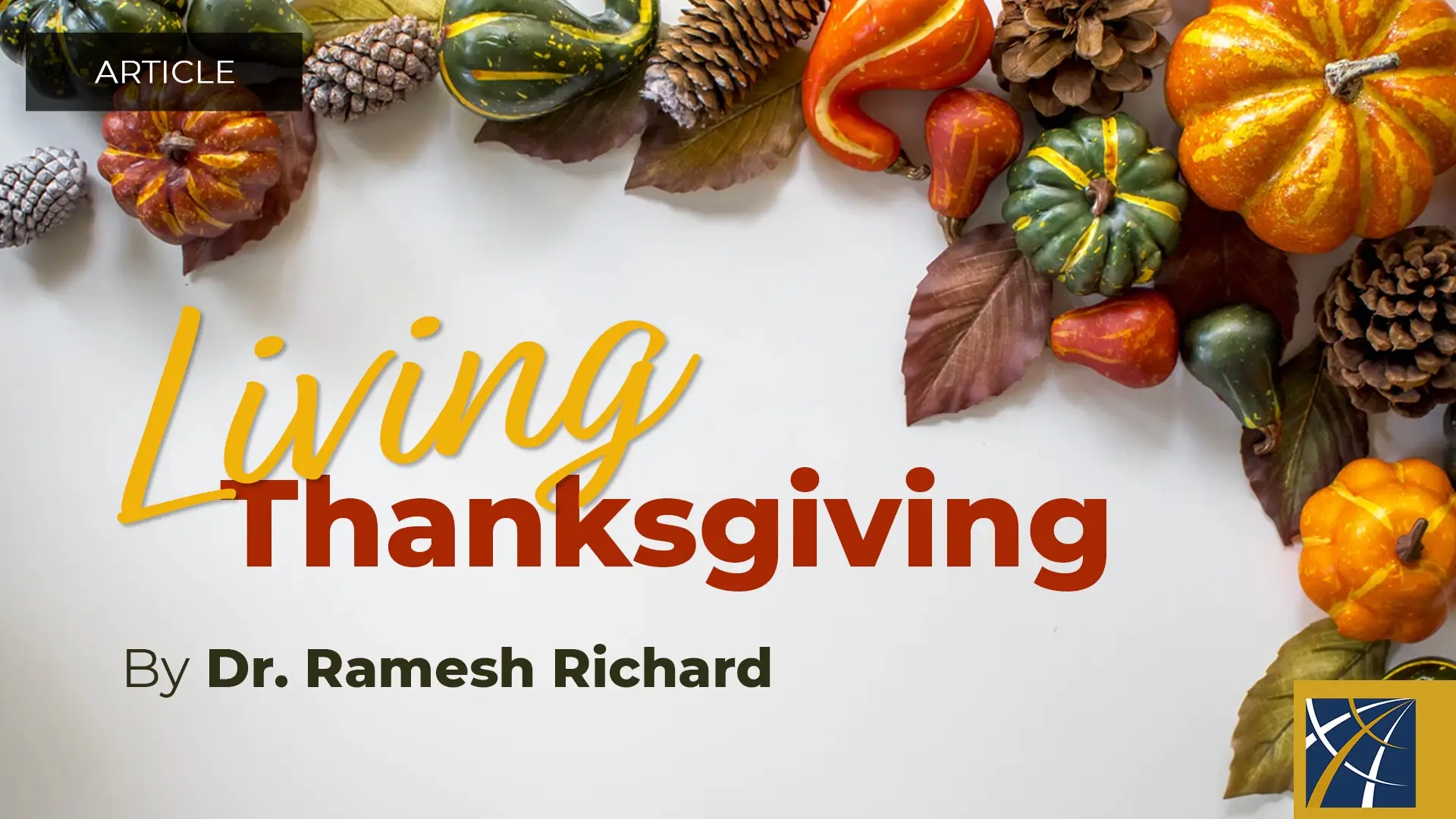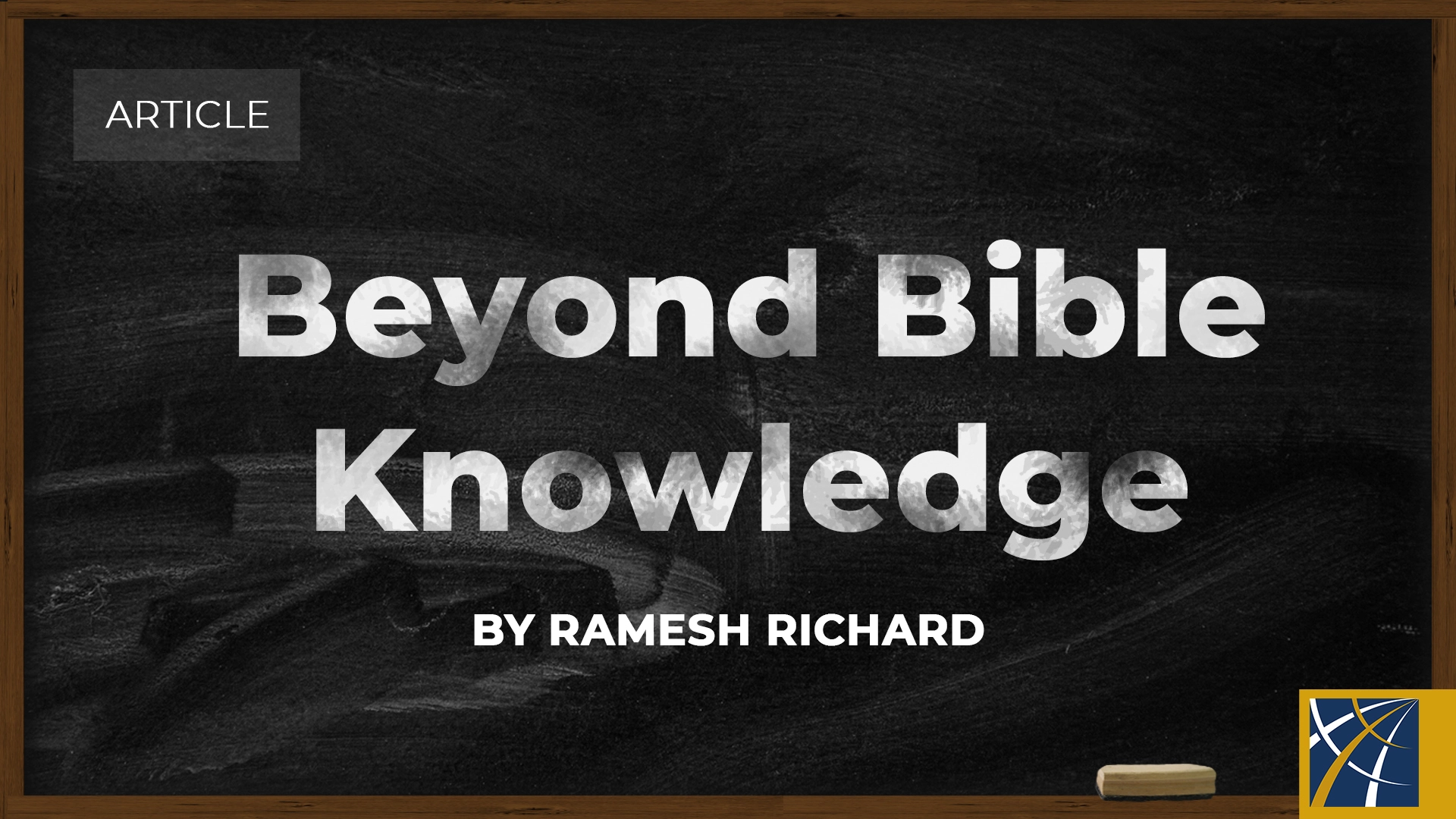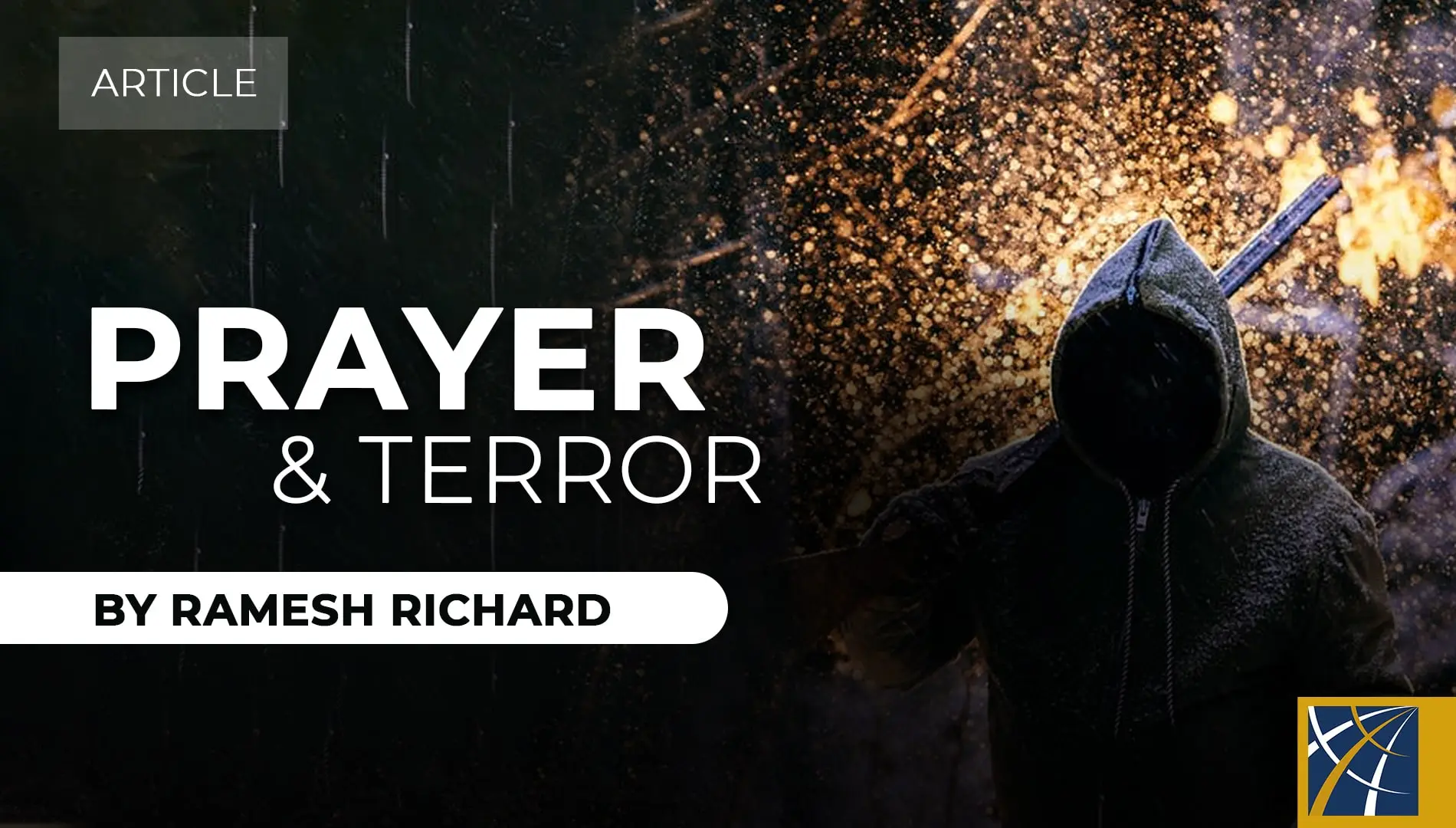Four Years On—Is Lesser Evil Still a Greater Good?
U.S. Elections: Guidance, Comfort and Wisdom*
By Ramesh Richard
It used to be easier to vote for presidents. Or to choose to vote at all. Believers would look for candidates most aligned with our (hopefully) biblically informed views and vote in good conscience. Yes, we experienced internal conflict about colliding priorities, but we could still satisfy ourselves about whom we supported.
Every election seems the most decisive one ever for the future of the nation, the church and the world. A sense of “vote-significance” has always been the case and should be; otherwise, democratic elections are façades.
And yet to me, this election seems poised to launch larger and longer consequences for the nation than before. This presidential election seems as existentially confusing as it is historically critical because neither candidate fully aligns with my views and both seem unworthy of my trust. The quandary affects my desire to get out and vote.
But I need not wring my hands in fret and doubt. Why not? We are not the only ones facing “all important” elections this year. Citizens from Singapore to Sri Lanka and Togo to Taiwan have already voted. Elections for 2020 are yet to be held in big countries like Nigeria and Egypt or remote ones like Belize and Myanmar. Christians from other nations regularly handle the dilemma of the “devil and the deep blue sea.” These fellow believers offer us some guidance, comfort and wisdom.
A Word of Guidance from Other Nations
The lack of trustworthy candidates is a standard feature across the world in every election. It might be somewhat new to Americans even though historians tell us about “crooks and criminals, conmen and clowns” running for office throughout our short history. Any exceptionalism has never been in the character of these human candidates but exists only in our constitution, institutions, laws and processes that yield certain outputs and positive outcomes. Other nations survive past their elections, at least in name, though maybe not in quality and influence. We will too, irrespective of who wins. So American Christian, do not fret!
Christians elsewhere cope well with election shenanigans. Always a minority, they express their preferences but do not place their hope in any one person, or one party, or even one political system. I attained voting age in the world’s largest democracy, which has over 1,000 unregistered split-offs from nationally recognized parties. Election time had a circus feel. Bright-colored trucks with car-battery-operated amplifiers carried candidates and their entourages. No one took all these candidates seriously except their groupies. I voted—not at all because I thought it was a moral obligation or that it made a major difference. I was merely convinced of the privilege of responsible citizenship, gained by the sacrifice of those before us and an opportunity not given to many in our world. I voted based on two factors: personal character (not personality) and potential consequences. So American Christian, do vote!
We can also learn from our brothers and sisters who process their “devil and sea” as part of the biblical framework of spiritual blessing and divine judgment for all peoples. If it were not for the perspective of spiritual blessing, they might think that God has absconded from their nations. They are instead convinced that God is loving their nations by calling believers to repentance, stirring the church to ministry, and bringing people to Himself. They also believe their nations are experiencing judgment while being blessed. The lack of better candidates or options suggests divine judgment. The rapid dilution of moral mores and conflict in social relations fulfill “last days” prophecies and denote divine judgment. Our brothers and sisters guide us theologically: American Christian, do not doubt God’s blessing or judgment!
Despite national brokenness, believers with double-citizenry allegiance find true hope in a robust theology of Jesus’s global Kingship and Jesus’s final Kingdom. The most broken nation in the Western hemisphere, Haiti, and a most broken nation in Western Africa, Liberia, are both democracies. At each election cycle, Haitian and Liberian Christians weep and vote with hope in God and without trust in princes. They attempt to authentically live out their faith through prayer in view of their ultimate citizenship and through civic service in view of their neighbor-love. Their guidance for us? American Christians, do trust! But only in God, His promises and His purposes.
A Word of Comfort from Scripture
Psalm 11 framed my message to broken Liberia and encloses what I wish to share with a breaking America. Verse 1 opens with “In the LORD I take refuge. How can you say to my soul: ‘Flee as a bird to your mountain.’” Today we live the cry of verse 3: “If the foundations are destroyed, what can the righteous do?”
The righteous have two options. One, is to somehow “fly away” from reality. Christians all over the world understandably share the temptation to withdraw from the pervasive corruption, degeneration and violence in their environments (vv. 1–3). If we take the escape route however, we make a horrific statement. Our retreat reveals that we lack radical confidence in God’s sovereignty. We don’t really believe He rules all (v. 4a), tests all (vv. 4b–5), and judges all (v. 6). The psalmist chides this faithlessness.
Whenever the righteous are afraid they find deep comfort in God’s sovereign awareness, activity and ability: “The LORD is in His holy temple; the LORD’s throne is in heaven” (v. 4). God’s good and powerful control of global realities means no leader of any nation gets there without God’s placement. All earthly leaders are temporary—in the U.S., presidents govern no more than 3,000 days. The late, 30-year then president of Zimbabwe was once asked when he would bid farewell to his people. The iron-fisted ruler purportedly replied, “Where are they going?”
Some “democracies” have presidents for decades, yet these leaders are all contingent. All leaders will die. All nations eventually cease.
The psalmist, toward his conclusion (vv. 4–7, especially v. 7), gives the righteous the option other than fleeing. Since the Lord is righteous, and loves righteousness, the psalmist calls us to a thorough commitment to doing righteousness. The upright are always upright. They practice what pleases God even as society breaks down.
So no Christian in any nation needs to run from reality; they need to stabilize their reading of reality with thorough confidence in God’s righteous sovereignty and receive deep comfort in it. Then weakening foundations won’t abate our ongoing commitment to righteous influence and activity in every sphere of human existence.
A Word of Wisdom from Experience
In terms of elections, Christians do not fret, they vote; they do not doubt, they trust God and they serve people. If believers can’t trust the character of candidates to foster an environment for engaging in righteousness (v. 7), can we move to a practical approach for decision making? Can we intentionally or intuitively analyze the risks of each office, candidate and policy to make a practical decision?
Voting for the “least-worst” candidate on the basis of the popular “lesser of two evils” principle assumes omniscience on our part. We really don’t know if the lesser evil will turn out to be the greater good.
In 2016, I discovered a sage approach during a lovely dinner in Singapore. Two older leaders of global stature, political experience and Christian conviction brought up U.S. politics.
Their practical advice to us? Vote for whoever will cause the most reversible damage.
I like that wisdom because we can apply it while still less than omniscient. It also avoids catering to a relative pragmatism where there is no biblical critique of a person’s moral character. Nebuchadnezzar, divinely positioned as monarch of Babylon embezzled God’s divine glory and experienced a divine deposition in response. Humbling himself before heaven, however, he was repositioned as the world’s only superpower.
Since neither U.S. presidential candidate is new to the nation in 2020, voters can take a longer view. Total damage (for example, obesity) results from small factors (like fast food) over a long time. This “sum total” concept applies to benefits too (such as regular exercise leading to better health).
My friends’ wise counsel in 2016, when candidates were quite unknown, can now be extended to the past and to a future of a decade or two. I recommend changing the superlative “most” into a comparative form. With forethought we can vote for whomever will cause the more reversible damage or less irreversible damage.
We can consider a record of their slogans and whims, commitments and changes, successes and failures, personality and character, influences and impacts, decisions and actions. The interested and the informed can project a trajectory, an index to a future under each candidate’s leadership.
Although we continue for a lifetime hoping for spiritual transformation and possible salvation of any presidential candidate as a person, we avoid placing too much hope in any meager human being’s leadership for a mere 1,500-day term.
May I add another important criterion, in superlative form, to the voting decision (whether two, three or a thousand parties)?
Cast a vote for the party which most delays the moral regress that eventually settles upon nations, choosing between conflicting priorities by what you will least regret. Do advocate technological progress, such as in beating disease, without accelerating death. But delay the moral regress that causes humans to use technology to marginalize morality and its peoples, those living now and those yet to be born. Each life by itself and all lives together make the very lifeblood of society. No lives, no society, no nation.
An inexorable fact grates on patriotic nerves: history proves that all countries and kingdoms must decline, though some last longer than others. Theology proposes only One King and His Kingdom as everlasting.
Until then, no civilization is permanent in history any more than any life is permanent on earth. A terminally ill, but sensible man is fully aware of eventual death yet unaware of how long he will live. He still actively takes measures to better the quality of his health and hopes to extend life. Similarly, concerned and wise citizens will take active steps for a good quality life for them and their nation. It will delay the dissolution. The alternative is a speedy decline leaving a wasted land for descendants.
How may we set about making a least regretful decision? We go back to the inescapable notion of “alignment” with the political party that better currently represents one’s values. When we are uncertain about individual candidates with life and term limits a-looming (the advantage of the American process) we shift to choose the “most and best” aligned party (not unlike imperfect Parliamentary means elsewhere) to our convictions.
Also, we look at only a current alignment, since political parties and politicians morph over time—a reason to study positions at local and national levels. The one confident about his or her conclusions also acknowledges another reality: Fellow Christian citizens will arrive at alternate, even opposing conclusions on what is considered essential and superficial to any given issue and context. Everyone bears a right to his or own convictions. Every voter deserves respect for the choices he or she makes, despite any befuddlement and disappointment, but without vitriol or violence.
These choices also take into account whom presidents (or prime ministers) place around themselves for public responsibilities, personal representation and potential replacement. One goes beyond personalities that may annoy to consider which policies, people, promises, platforms and performance align with the voter’s convictions.
My own convictions, founded and increasingly fashioned by my understanding of the themes and thrusts of Scripture, move my choice and voice toward a person/party, with a platform that
- Conscientiously, not superficially, is formed by biblical and theological propositions—for instance, the identity, equality and dignity of each life from “womb to tomb.”
- Deliberately, not randomly weights moral and social policies—for instance, freedom of worship for all, including those who adhere to secular religion.
- Intentionally, not accidentally supports economic and cultural priorities—for instance, the promotion of marriage and family relationships that fosters the perpetuation and significance of the human race.
- Actively, not passively, evaluates a political party’s ongoing performance against past promises—for instance, the strategic protection of well-being in both transient and abiding ways for the peace and safety of various publics.
Here then is principled practice: Mix a strong view of God’s sovereignty with a long view of human history, and then vote. Whether by mail or in a booth, choose whichever party will likely cause the more reversible damage or less irreversible damage, or even better will also most delay regress to leave you with least personal regret.
This kind of voting decision requires no omniscient awareness about “lesser evil” or “greater good” outcomes. It does require a certain prescience combining knowledge with wisdom, discernment with humility, and preparation with action. We act toward reversing what a democratic (or republic) system allows periodically: voting either directly or through elected representatives to overturn a person, party, or policy should the elected not keep their promises.
Fortunately, this world system is the worst environment Christians will endure even as it hastens our marginalization and possible martyrdom. However, “the upright will behold His face” (v. 7c)—the ultimate, intimate yearning of every human heart. A personal grasp of this final guarantee through the Lord Jesus characterizes Christians past and present who practice righteousness during times of crumbling moral, social and economic foundations. Regardless of who “wins”—all triumphs are temporary—they resolve to act justly, love mercy, walk humbly in the spirit, name and truth of their Lord Jesus.
If the foundations are destroyed, what can the righteous do? Believers can continue to do what their godly forerunners did and their global family does: Keep on trusting God’s sovereignty, and keep on doing God’s righteousness.
*“Is Lesser Evil a Greater Good? U.S. Elections: Guidance, Comfort, Wisdom,” was the title of my shorter article in October 2016 found here. With nearly four years behind us, the latter part is significantly extended.


